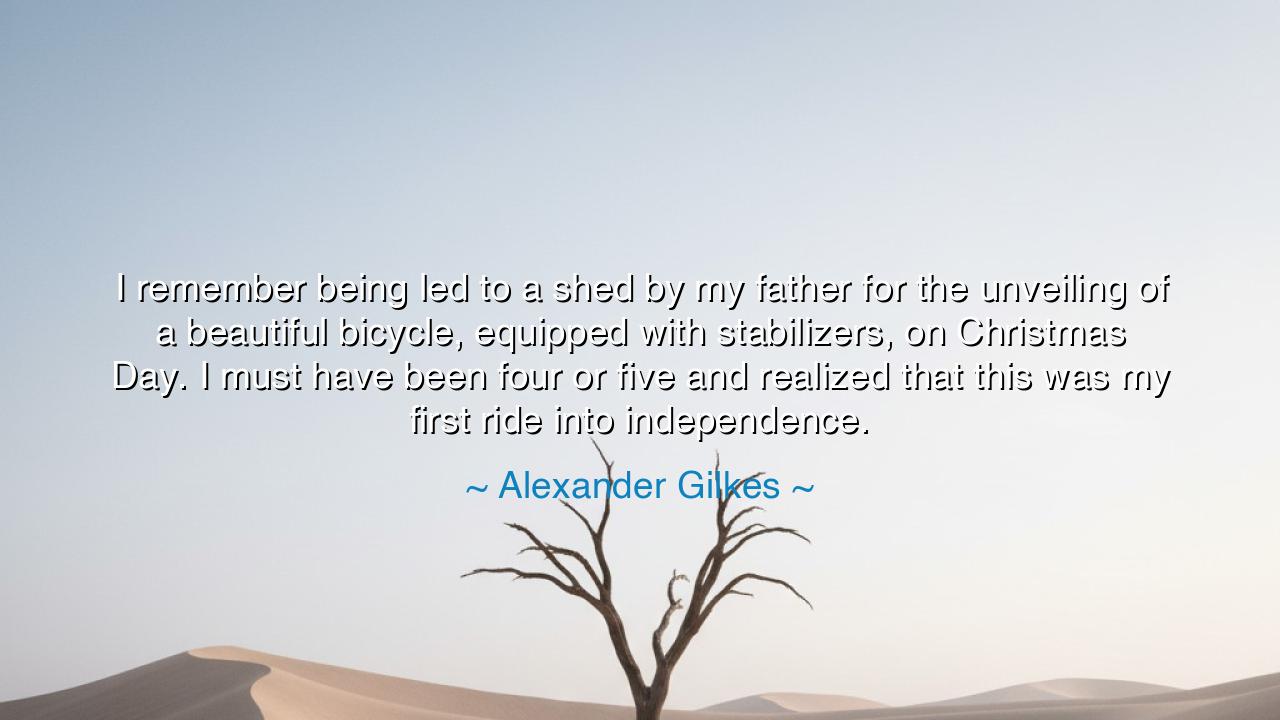
I remember being led to a shed by my father for the unveiling of
I remember being led to a shed by my father for the unveiling of a beautiful bicycle, equipped with stabilizers, on Christmas Day. I must have been four or five and realized that this was my first ride into independence.






The words of Alexander Gilkes, when he recalled, “I remember being led to a shed by my father for the unveiling of a beautiful bicycle, equipped with stabilizers, on Christmas Day. I must have been four or five and realized that this was my first ride into independence,” are tender yet profound — a quiet revelation of one of life’s earliest awakenings. Beneath the simplicity of a child’s joy lies a universal truth: that the journey toward independence often begins not with thunder or triumph, but with small, trembling steps, guided by love and trust. In that moment of wonder, when the bicycle first touched the earth and the boy’s hands gripped its handlebars, a seed of freedom was sown — a seed that would grow into courage, self-reliance, and destiny.
For the ancients would have said: every great voyage begins with a single turn of the wheel. That bicycle, adorned with stabilizers, was not just a toy but a symbol — the bridge between safety and discovery. The father, like a wise teacher, did not carry his son upon his shoulders but placed before him a means to stand, to move, to balance. In doing so, he performed one of the oldest acts known to humankind: the sacred release of protection, allowing the young to walk their own path. Thus, the shed became a temple of passage, and that Christmas morning, a quiet rite of initiation. The boy did not yet know it, but he had been handed his first lesson in freedom — that to fall and rise again is the rhythm of becoming.
The scene brings to mind the story of Icarus, the youth of Greek legend who soared upon wings crafted by his father, Daedalus. Though Icarus flew too close to the sun and fell, his tale endures not as one of folly alone, but of the eternal hunger to test the limits of one’s own strength. Every parent must, like Daedalus, give their child the means to fly — to pass on tools, not chains. And every child, like young Gilkes on his bicycle, must one day ride into the unknown, guided not by the hands that once steadied them, but by the balance they have learned to find within themselves. Independence, then, is not rebellion against guidance, but the fulfillment of it.
There is a gentle beauty in how Gilkes’s father unveiled the gift — not as a command, but as a gesture of faith. The stabilizers, those little wheels of security, remind us that freedom is not born in an instant. It begins with support, with a structure that allows the spirit to learn balance before it ventures alone. In this there is wisdom: to be independent does not mean to have never relied on another, but to have learned from reliance how to stand upright. Even the eagle must first learn the wind beneath its mother’s wings before it dares to soar alone.
So too, in our own lives, do we receive our “first bicycles” — the moments when we are given the chance to choose, to act, to shape our path. It may be the first time we leave home, the first risk we take, or the first dream we pursue against fear. Each moment bears the same sacred pattern: the unveiling, the trembling start, the fall, the rise. The lesson is always the same — that growth is not without bruises, and independence is not a gift given whole, but a skill earned through trial and tenderness.
Remember too the grace of the father’s love in this tale. He did not cling, nor did he abandon; he prepared, he trusted, and he watched with pride. Such is the art of nurturing — to know when to hold and when to release. The parent who never lets go imprisons the soul, but the one who releases too soon endangers it. The wise guide knows that independence is not the breaking of bonds, but the stretching of them — a bridge of trust that endures even when distance grows.
Let this story, then, be your mirror, O seeker. Whatever your age, remember your own first bicycle — that moment when you first chose to steer your life, to fall and rise on your own strength. Honor those who guided you to that point, for their belief in you was the soil from which your courage grew. And when your time comes to guide another — a child, a student, a friend — do as Gilkes’s father did: unveil the gift, but let them ride.
For the teaching is timeless: independence is not born of isolation, but of love that sets free. Embrace the balance between guidance and daring, between fear and faith. Ride boldly into the unknown, and when you fall — as all must — rise again with gratitude. For every pedal forward, every breath of wind in your face, is not just a journey through space, but through the heart itself — the eternal ride into becoming.






AAdministratorAdministrator
Welcome, honored guests. Please leave a comment, we will respond soon